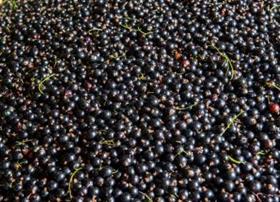
Growers have picked the first crop of a new “climate resilient” blackcurrant developed by The James Hutton Institute.
The new ‘Ben Lawers’ variety is the culmination of an incredible 20 years of research requiring 75,000 bushes, and will help guarantee the future of British blackcurrant production, of which 90 per cent goes into making popular drink Ribena.
The new variety is the fruit of a longstanding partnership between Lucozade Ribena Suntory, and the world-leading research centre the James Hutton Institute.
According to the Dundee-based researchers, blackcurrants are particularly at risk from the UK’s changing climate, where winters have been gradually getting warmer.
The bushes require a ‘winter chill’ in order to bear fruit come summertime - a process known as vernalisation. As our winters warm, soft fruits such as blackcurrants will have to adapt to shorter, milder chilling.
Lucozade Ribena Suntory has invested over £10 million in work with the James Hutton Institute, including recent investment of £500,000 to continue the research into climate change that began 20 years ago and is producing first fruits today.
Harriet Prosser, agronomist at Lucozade Ribena Suntory, said:“This year’s harvest sees farmers reaping the rewards as 20 years of research comes to fruition in.
“Thanks to continued hard work and research, this breed of blackcurrant is now ready for juicing on a large scale to produce that classic Ribena taste. Harvest is always the most exciting time of the year but this time around it promises to be doubly rewarding. This year’s weather has demonstrated why we need to be on the front-foot in adapting to a changing climate.”
Dr Dorota Jarret, a soft fruit breeder at the James Hutton Institute’s commercial subsidiary, James Hutton Ltd, added:“We are delighted to see the first commercial crop of Ben Lawers this year. Hopefully this cultivar will pioneer innovation in climate resilient crop category, deliver exceptional quality and make the way for further climate-resilient cultivars that are currently on trials at the James Hutton Institute thanks to Lucozade Ribena Suntory’s recent investment.”
Jo Hilditch, a blackcurrant grower and head of the Blackcurrant Foundation who is growing the new variety of climate-change resilient berries, comments:“We have experienced some challenging weather conditions this year after a very warm winter and the driest May on record. Thankfully, the June showers followed by some warm weather has helped all our blackcurrant breeds and we are looking forward to a lovely sweet crop that will deliver the distinctive taste Ribena fans know and love.”



